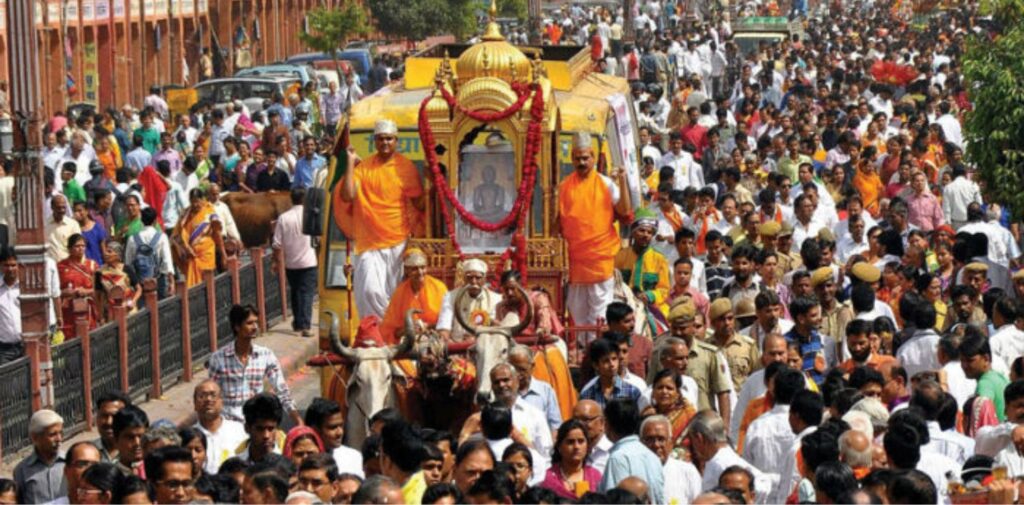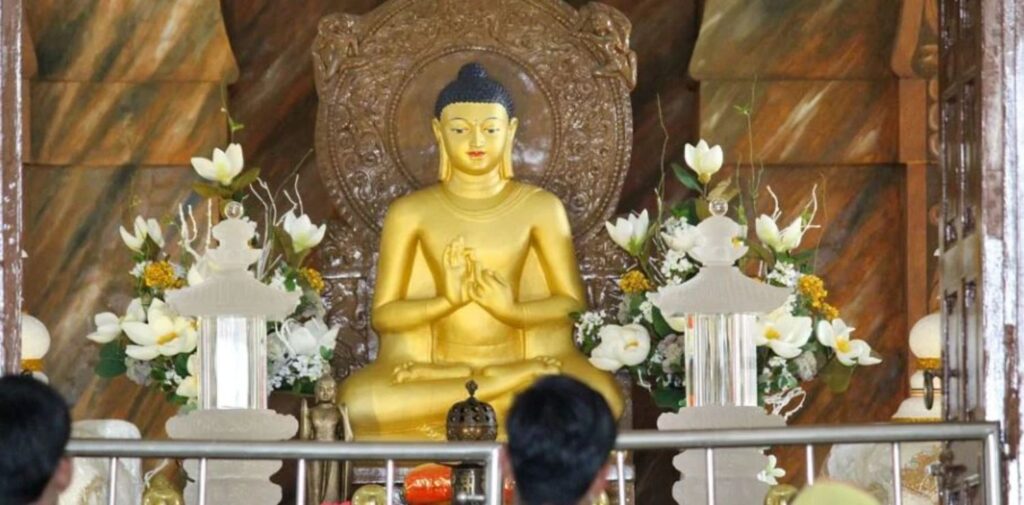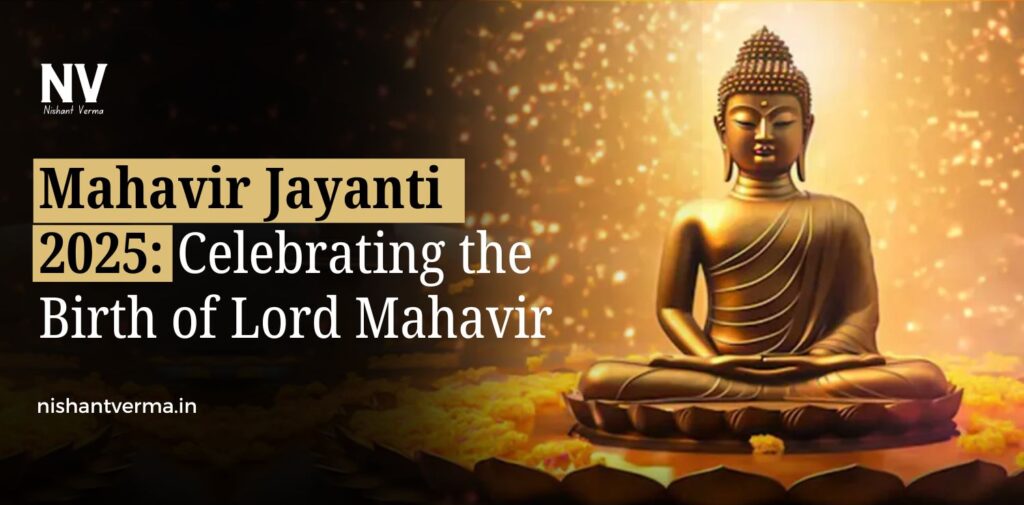Mahavir Jayanti is a significant religious celebration for Jains all over the world. It marks the birth of Lord Mahavir, the 24th Tirthankara in Jainism, who is revered for his teachings of non-violence, truth, and asceticism. The festival, which falls on 10th April 2025, is a time for Jains to reflect on the principles of Lord Mahavir and renew their commitment to living a life of peace, compassion, and spirituality. Mahavir Jayanti is not only a religious event but also a celebration of Jain philosophy and its values that continue to influence people today.
Who Was Lord Mahavir?
Lord Mahavir, born as Vardhaman in the 6th century BCE in the region of present-day Bihar, India, was the last of the 24 Tirthankaras in Jainism. The term “Tirthankara” refers to a spiritual teacher who has attained complete enlightenment and shows the path to others. Mahavir’s teachings focused on the core principles of Jainism, which include ahimsa (non-violence), satya (truth), asteya (non-stealing), brahmacharya (chastity), and aparigraha (non-possessiveness). His life and teachings continue to inspire millions of people, both within the Jain community and beyond.
Lord Mahavir is known for his commitment to asceticism, renouncing worldly pleasures to seek spiritual liberation. After attaining enlightenment at the age of 42, he spent the next 30 years spreading his philosophy and gaining followers. His teachings emphasize living a life free from harm, both to oneself and to others, and focus on personal responsibility for one’s actions. He also stressed the importance of compassion towards all living beings, regardless of their form or size.

Celebrating Mahavir Jayanti in India
Mahavir Jayanti is celebrated with great enthusiasm and devotion across India, especially in regions with large Jain populations such as Gujarat, Rajasthan, Maharashtra, and Delhi. The celebration is marked by religious rituals, processions, and community gatherings. Jains come together to honor the life and teachings of Lord Mahavir, offering prayers and engaging in acts of charity.
The day begins with devotees visiting Jain temples to offer prayers, perform rituals, and listen to discourses on Lord Mahavir’s teachings. Many temples are decorated with flowers, lights, and religious symbols, creating a vibrant and peaceful atmosphere. In some areas, people gather to recite verses from Jain scriptures, including the “Mahavir Stotra” and other hymns, as an expression of devotion.
The Significance of the Mahavir Jayanti Procession
One of the most prominent features of Mahavir Jayanti celebrations is the procession, which takes place in many cities across India. The procession is a vibrant and colorful event, often led by Jain monks and nuns, and accompanied by devotees holding flags, chanting prayers, and singing devotional songs. The procession symbolizes the journey of Lord Mahavir and his teachings, reminding people of the importance of spiritual practice and self-discipline.
In the procession, a chariot carrying an idol or image of Lord Mahavir is paraded through the streets, accompanied by devotees offering flowers, incense, and prayers. The atmosphere is filled with spiritual energy, as the crowd sings hymns and praises Lord Mahavir’s virtues. This procession also serves as a reminder of the need for peace, compassion, and non-violence in our daily lives.

The Core Teachings of Lord Mahavir
The teachings of Lord Mahavir are at the heart of Mahavir Jayanti celebrations. His message of non-violence, truth, and compassion is a call to live a righteous life, not just for personal spiritual growth, but for the betterment of society and the world at large. The following core principles form the foundation of Jainism and are celebrated on this day.
- Ahimsa (Non-Violence): Ahimsa, or non-violence, is the most important teaching of Lord Mahavir. He believed that every living being, whether human, animal, or plant, has a soul and should be treated with respect and kindness. Ahimsa is not just about refraining from physical harm but also about avoiding harm in thought, word, and deed. This principle encourages Jains to live in harmony with all living beings and to practice compassion in every aspect of their lives.
- Satya (Truth): Lord Mahavir emphasized the importance of truthfulness in all actions and communications. He believed that truth is the path to enlightenment and that one must always speak the truth, even if it is difficult or uncomfortable. Truth, according to Mahavir, is not just about honesty in speech but also in thoughts and intentions.
- Asteya (Non-Stealing): Asteya, or non-stealing, teaches that one should not take what belongs to others, whether it is material goods or intangible resources like time and effort. This principle encourages individuals to live a life of contentment, avoiding greed and the desire to take from others. By practicing asteya, one can develop a sense of respect for others’ rights and property.
- Brahmacharya (Chastity): Brahmacharya, or chastity, is about controlling one’s desires and living a disciplined life. Lord Mahavir taught that true spiritual growth requires the control of physical and emotional desires. While this concept is often associated with celibacy in Jainism, it also refers to maintaining purity in thoughts, actions, and relationships.
- Aparigraha (Non-Possessiveness): Aparigraha is the principle of non-possessiveness and detachment from material wealth. Lord Mahavir believed that attachment to material possessions leads to suffering and prevents spiritual growth. By practicing aparigraha, one learns to live a life of simplicity and contentment, focusing on the things that truly matter, such as kindness, compassion, and spiritual development.
Acts of Charity and Giving Back to Society
In honor of Lord Mahavir’s teachings, Mahavir Jayanti is also a time for Jains to perform acts of charity and give back to society. Charity is an important part of Jain philosophy, and many devotees use this occasion to make donations to causes such as education, healthcare, and welfare for the underprivileged. Jain temples often organize free medical camps, food distribution, and other charitable activities on this day.
The concept of dana (charity) is deeply rooted in Jainism, as it reflects the idea of selflessness and caring for others. By practicing charity, Jains not only help those in need but also cultivate humility and self-restraint, which are essential for spiritual growth. Mahavir Jayanti is, therefore, a time to not just reflect on Lord Mahavir’s teachings but to put them into practice by making a positive difference in the community.

The Global Impact of Mahavir Jayanti
Although Mahavir Jayanti is primarily a religious observance for Jains, its message of peace, non-violence, and compassion has a global appeal. Lord Mahavir’s teachings are universal and encourage people of all faiths and backgrounds to live a life of kindness and respect towards others. In today’s world, where violence, hatred, and environmental destruction are major concerns, the principles of Jainism offer a path toward healing and peace.
The celebration of Mahavir Jayanti also serves as an opportunity to raise awareness about Jainism and its contributions to global philosophical and ethical thought. Jainism, with its emphasis on environmental sustainability, non-violence, and respect for all life forms, offers valuable insights into how we can live harmoniously with the world around us. As people around the globe continue to seek ways to live more consciously and sustainably, the teachings of Lord Mahavir remain highly relevant.
Conclusion: A Day to Reflect and Renew Our Commitment to Peace
Mahavir Jayanti, celebrated on 10th April 2025, is a day to honor the life and teachings of Lord Mahavir, one of the greatest spiritual leaders in history. It is a time for Jains to come together in devotion, reflect on the principles of non-violence, truth, and compassion, and renew their commitment to living a righteous life.
While Mahavir Jayanti is an important occasion for the Jain community, the message of Lord Mahavir is universal and serves as a guide for people of all faiths and backgrounds. As we celebrate this day, let us remember the values of peace, compassion, and self-restraint and strive to live a life that reflects the teachings of Lord Mahavir. By doing so, we can contribute to creating a more peaceful and compassionate world for ourselves and future generations.




